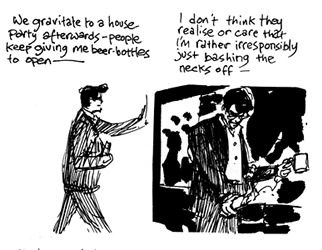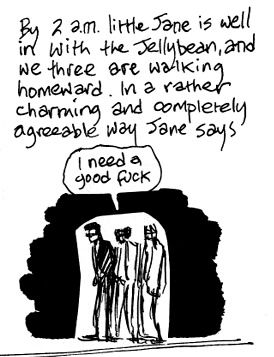It's my birthday, so I'm going to be more than usually self-indulgent this week and just say this as if it were a demonstrable fact: Eddie Campbell's Graffiti Kitchen is the best comic ever made.
(It's not, of course, although I say that more because I don't believe in such concepts as "best [whatever] ever made," when it comes to art - I think that it's the kind of quality distinction that doesn't really exist, because it's so subjective; it's definitely my favorite comic, but try extolling its virtues to someone who'd rather read Youngblood in any of its multiple incarnations than cracking open a black and white book with scratchy art and absolutely no superpowers whatsoever. To someone like that, the Joe Casey/Rob Liefeld YB hardcover may be the best comic ever made, just like I don't expect that many people to believe me that "From A Basement On The Hill" is Elliott Smith's best album, even though it clearly is. I mean, come on.)
I first read Kitchen around the same time that I discovered Cages. I can't really remember what the impetus was for me to pick it up in the first place; the cover of the original version wasn't particularly eyecatching, the name didn't seem especially promising, and I'm not sure that I'd ever read any Eddie Campbell before aside from a Bacchus strip or two years earlier, but for whatever reason, I soon found myself holed up in the apartment I was living in at the time, completely in love with Campbell's work. What made it work for me in a way that still keeps it above so much of the rest of the autobio work I've read since is the mix of honesty and perspective; it's happened enough in the past that Campbell can point out when he's been in the wrong, selfish or just plainly asshole-like without wanting to gloss over any embarrassment it could cause to admit that, but it's also completely lacking in any sense of faux pride or whatever about the jerky behavior - there's no showing off how much of an idiot he has been, as can be the case elsewhere, it's just... telling it like it is. Or, at least, giving the impression that that's what he's doing.
And, accompanying such honest writing - helped, by the way, by his wonderfully conversational tone, an entirely unreliable narrator who makes the story seem more reliable - is the art, which shouldn't have worked for me back then: It was scratchy, sketchy, unfinished and messy, back when I was looking for pristine things that looked as if a lot of time had been spent making each image perfect. But it worked because it fit the writing so perfectly, seeming intimate and unclear like a memory, and with Campbell's ability to cut to the heart of a character through gesture in a deceptively simple style.
Graffiti Kitchen was the first comic that I read and felt that it was something I'd always wanted to read but never had the ability to imagine, even though it was about something as mundane as failed romance. When he - through the disguise of Alec McGarry - calls himself mythical at the end of the book, he's both right and wrong: He turns reality into something with the weight and importance of myth by reminding you of the importance of the real world. I don't care what anyone else says, today: It really is the best comic ever made.


